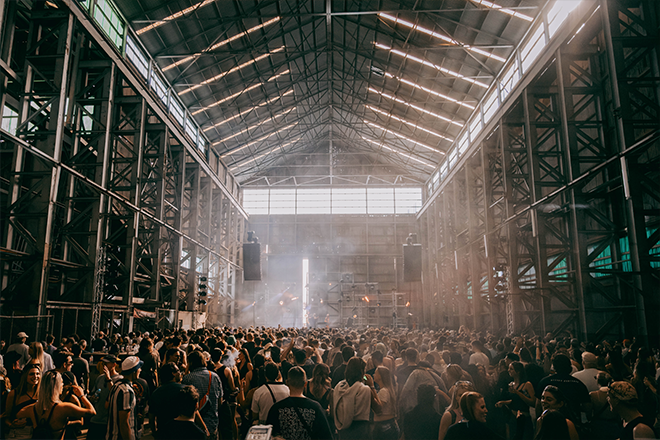Mode Festival forced to pay for NSW Police with arts grant funding
Mode's Eora instalment is one of the smallest and most expensive in NSW for user paid policing.

As the list of Australian festival cancellations grows, the SMH has reported this morning that the police user pay charges for Mode Festival, specifically its NSW offering, will be raised in NSW Parliament today.
After the announced cancellation of NSW festivals like Splendour In The Grass, Groovin The Moo and Bluesfest, NSW Labour has been under intense pressure to address the rising costs placed on festivals, particularly those by police.
Like many dance and electronic events before it, Mode has been designated a ‘risky event’ by NSW Police for all three years of its existence. This ‘risky’ definition is part of a 2019 law put in place by the then Premier Gladys Berejiklian, which was designed to curb the perceived risks of less established festivals, dance music and punter drug use.
As SMH reports, last year Mode "was charged more than $50,000 for police patrols including almost $6000 for use of three water rescue boats on standby in case of accidents. NSW ambulance’s attendance fee was $13,450.”
In an interview with SMH, Mode organiser Joe Ireland appeared not to blame NSW Police, who he claims the festival has an excellent relationship with, but instead blamed legislation.
“We are one of the few festivals to pop up post pandemic,” he said. “Once a festival goes you lose your crowd’s confidence, and they never come back. And, there are no replacement events for those that cancel. No one is risking starting these events in such a hostile climate.”
NSW stands as the most expensive state in Australia to run festivals in, almost entirely due to these user paid policing costs. Mode has been running for three years, last year launching an event in Naarm/Melbourne. In contrast to the NSW instalment, this year’s Naarm event is set to not pay any costs associated with police.
User paid policing, while a state-police based policy, is almost entirely national. While South Australia doesn’t charge, VIC, WA, QLD & NSW do, with QLD & NSW being the most expensive. These costs are, generally, event dependent.
“The Australian Festival Association (AFA) told the Guardian of even more extreme discrepancies, including one festival where NSW police charged $67,000 for patrolling a 22,000 crowd, while the force’s Victorian equivalent charged only $7,500 for a crowd of 30,000. In Queensland, the same show cost $37,000 for a crowd of 20,000.”
Mode’s ‘risky’ definition is one regularly placed on festivals showcasing and platforming electronic music, a series of genres generally associated with younger punters. Ireland and his cofounder Robin Sen started Mode when they were just 22, and have had to dedicate much of their energy to paying these costs and building them into festival budgets.
This year the pair won a grant from Create NSW, designed to assist in their platforming of local and international acts. All of this money has instead been forced to be used to pay police.
Greens MP Cate Faehrmann is a vocal advocate against user paid policing, pill testing and for festivals. Her social media presence has, particularly recently, seen her pushing even harder against user paid policing legislations as more festivals announce their cancellation.
A post shared by Cate Faehrmann (@greencate)
The Australian Festivals’ Association on Monday of this week launched a social media campaign calling on punters to write to NSW police and arts ministers to voice their concerns over the act.
A post shared by Australian Festival Association (@australianfestivalassociation)
New, young, electronic festivals are clearly not going anywhere either.
According to Creative Australia’s 2024 report Soundcheck: Insights into Australia’s music festival sector, “the most popular music genre for Australian music festivals is electronic. Almost one in four music festivals in Australia is an electronic music festival (23% of festivals), 41 which encompasses several subgenres including dance, electronic dance music (EDM), electronica, house, psychedelic, techno, and trance.”
As punters move away from festivals with larger capacities, events like Mode stand as a far more affordable alternative that’s a lot closer to home. Even without any non-critical medical transfers in its lifetime, it still faces the same overarching cost challenges as larger festivals.
Mode Eora has a capacity of 6,000 people, and is one of the smallest festivals to be targeted by NSW Police.
“This essentially put us under the microscope and means we have to prepare a Safety Management Plan - a document which is currently over 500 pages long which includes plans from a vast number of stakeholders,” Ireland told the SMH.
“This elevates the requirements for an event and really is the difference between manageable costs and costs blowing out.”
NSW Parliament is meeting today to discuss the legislation.
-
Tickets to Mode Eora & Naarm are still available, find them via Mode’s socials here.
Jack Colquhoun is Mixmag ANZ’s Managing Editor, find him on Instagram.


